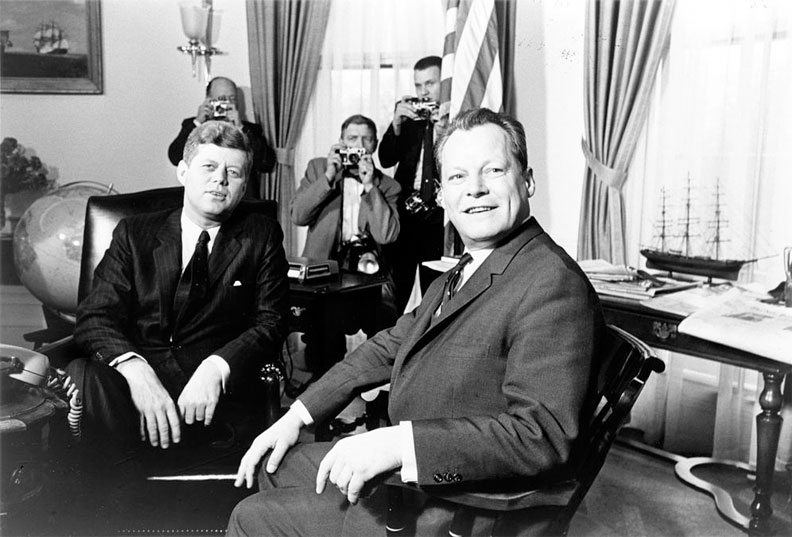1974 Brandt Resigns

Brandt with JFK
Willy Brandt resigned on May 6th 1974, after one of his top aides, Gunter Guillaume, was arrested on charges of spying for East Germany...
Willy Brandt's tenure as Chancellor was marked by his policy of Ostpolitik, which sought to improve relations with Eastern Europe and the Soviet Union. This policy aimed to ease tensions and promote cooperation between the East and the West during the Cold War. One of the most significant achievements of Brandt's Ostpolitik was the signing of several treaties with Eastern European countries, such as the Treaty of Moscow (1970) and the Treaty of Warsaw (1970), which recognized the existing borders and established diplomatic relations. These initiatives culminated in the signing of the Basic Treaty (1972) with East Germany, paving the way for improved relations between the two German states. Additionally, Brandt's government introduced various social and economic reforms, which contributed to West Germany's prosperity.
The Guillaume Affair: The events that led to Brandt's resignation began with the exposure of a spy scandal, known as the Guillaume Affair. Günter Guillaume, a close aide to Brandt, was arrested on April 24, 1974, and charged with spying for East Germany's secret service, the Stasi. This revelation sent shockwaves through the West German political landscape, as Guillaume had been privy to sensitive information and had access to the Chancellor. The Guillaume Affair raised serious concerns about the security of West Germany's government and the effectiveness of its counter-espionage efforts.
Brandt's Resignation and Its Implications: Despite the fact that Brandt was not directly implicated in the Guillaume Affair, he took full responsibility for the security lapse, as he had been the one who had appointed Guillaume. On May 6, 1974, Brandt submitted his resignation, a decision that took many by surprise. His resignation not only marked the end of his political career but also signaled a turning point in West German politics.
Brandt's departure had several immediate implications. First, it led to a power vacuum within the SPD, as the party scrambled to find a new leader. Eventually, Walter Scheel, the then President of West Germany, appointed Helmut Schmidt, a fellow SPD member, as the new Chancellor. Schmidt, known for his pragmatic approach to politics, would go on to lead West Germany for the next eight years.
Second, Brandt's resignation impacted West German domestic politics by causing a shift in political priorities. Although Schmidt continued to pursue the policy of Ostpolitik, he also placed a greater emphasis on economic stability and military security. This shift in focus led to the strengthening of the West German economy and the modernization of its armed forces.
Lastly, the resignation had repercussions in international politics. Brandt was a well-respected figure on the global stage, and his departure raised concerns about the continuity of his policies. However, under Schmidt's leadership, West Germany managed to maintain and even expand its international standing, particularly within the European community and NATO.
 >
>